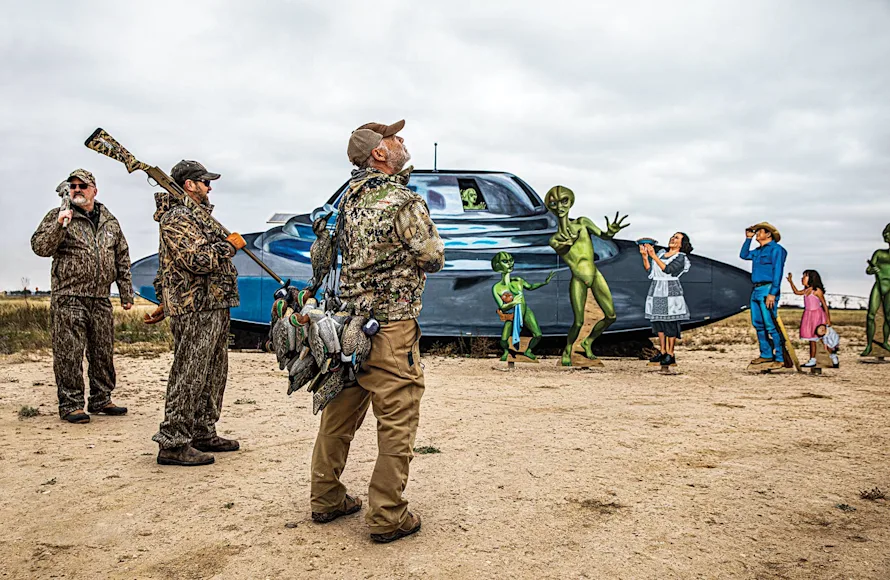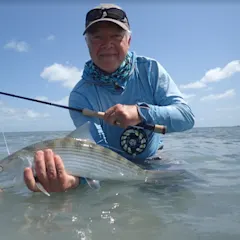We drove south from Albuquerque, trailing the cottonwoods along the Rio Grande, down the old Spanish royal road that once stitched old Mexico City to old Santa Fe, down to the funky town of Truth or Consequences, and then east, over the high, piney Capitan Mountains to drop through the black lava fields of the Valley of Fires, the land of crusted ember.
It was a strange place for a duck trip. We sortied toward the Pecos River and Roswell, a town that attracts conspiracy theorists, UFO believers, and tourists who flock to gift shops selling alien dolls and scorpion-filled lollipops. We hunted hard and a little mean in a great southern arc across New Mexico’s Chihuahuan Desert because hidden in the heat shimmer, in the sage, mesquite, rubber rabbitbush, and wolfberry, in the marshes along the Rio Grande and Pecos rivers, were the ducks.
And the ghosts. We never were far from the ghosts.
For my friend James Powell, this was a homecoming. He was born in Roswell and spent his early years in Albuquerque. He hunted mule deer with his father in the big woods around the family cabin near the iconic peak of Sierra Blanca, and his stepfather took him on waterfowling trips to the Bosque del Apache National Wildlife Refuge, on the Rio Grande, when he was 6 years old. At the White Sands Missile Range, where Powell worked as a young biologist, he ran vegetation transects across creosote flats and rattlesnake dens. He learned to love the marsh, he told me, “because when you’re raised in the desert, a wetland seems like a miracle.”
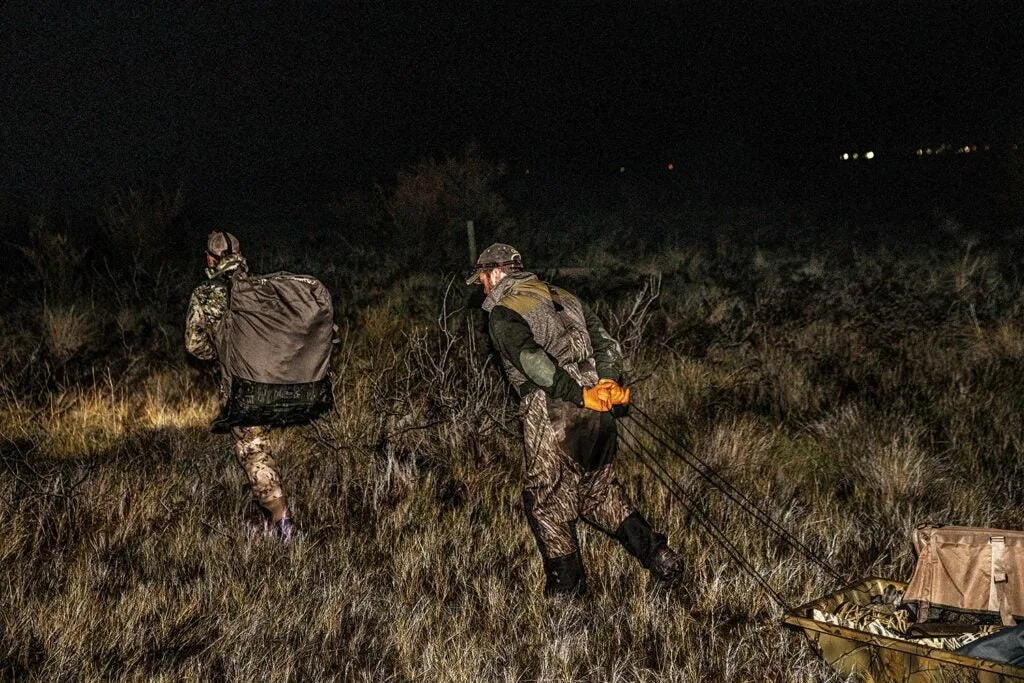
The author and Powell haul gear to their hunting spot before legal light. Tom Fowlks
The passion paid off in unexpected ways. Powell is now chief of communications for Ducks Unlimited, and he and I have hunted together for years. We have a lot in common: jobs tied to a vibrant natural world, sons who share our love of feathers and marsh muck, and memories of fathers whose passion for the outdoors set the rudder angle of our own lives. Powell had been thinking of this road trip for a long time, and he regretted not pulling it off sooner. His father had passed away three years earlier, and James Powell the elder would have loved sharing this road again, and a few more desert sunrises, with his son.
“Now you and I can talk about this trip until one day all we can talk about is how much we wished we’d done it,” Powell told me. “Or we can hit the road.” He didn’t have to ask twice. Shooting ducks, sharing old stories, and looking shoulder to shoulder into the past are precisely what friends are for.
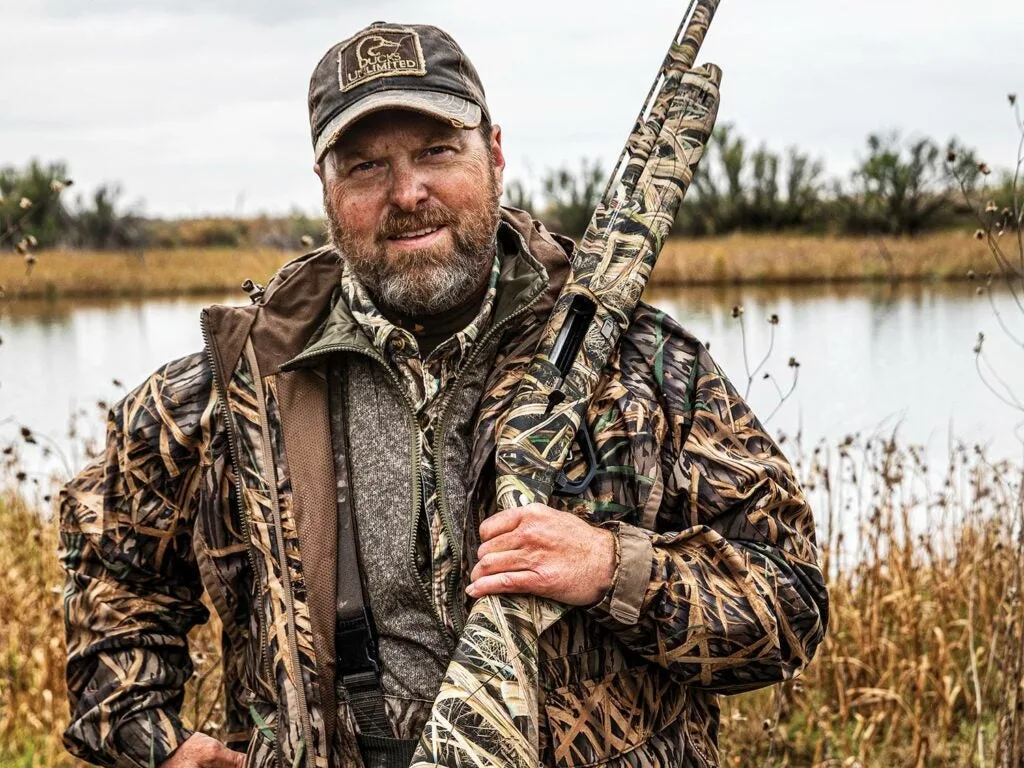
Powell manages a smile despite the slow action. Tom Fowlks
Our sprawling loop traced a rough line along Powell’s own history here, jumping from duck hole to duck hole from the Rio Grande to the Pecos. Each waterway is a long, linear oasis in an arid landscape. Enormous marshes unfurl for miles between the rivers and nearby mountains. The ducks, geese, and sandhill cranes that get this far south have their backs against the wall. They put down roots for the winter, and they get smarter with each passing day.
Which makes chasing waterfowl here a bit of a crapshoot. There’s a lot of dry land between one decoy set and the other, which requires a lot of time behind the windshield—and a lot of miles and hours to muse on where the ducks might be out here in cowboy-and-alien country.
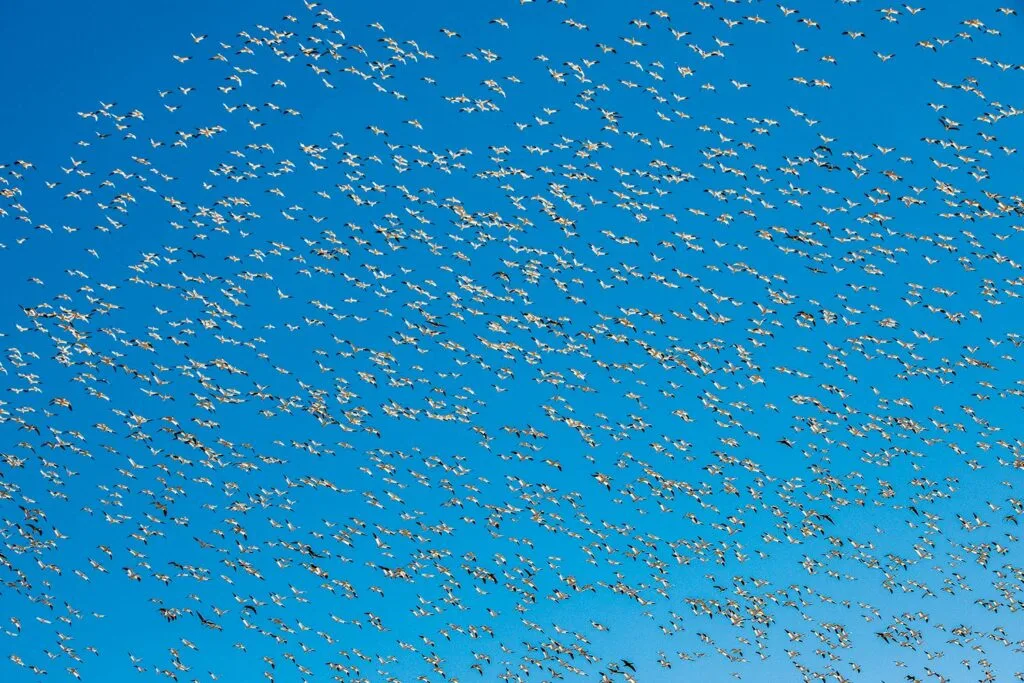
A massive flock of snow geese migrates north over Bosque del Apache National Wildlife Refuge. Tom Fowlks
Off to a Hot Start
The first ducks were close, willing, and easy—although they required a down payment of sweat and scramble. Two hours before sunrise, we followed our guide’s pickup truck down 2 miles of off-road switchbacks, deep into a half-dry lake bed, headlights boring through dense stands of mesquite and yucca. In the dark, we buried one truck to its chassis in soft sand. Digging it out put us way behind schedule, kicking off a mad sprint to beat the sunrise. Worn out before we even uncased the shotguns, we crawled into a pair of layout blinds half sunk in the muck. The lake’s receding water left behind a crazy plain of sprawling cocklebur fields pocked with silty potholes. We were hemmed in by cactus and rock cliffs. It was as un-ducky a spot as I’d ever seen. And then the predawn light seeped up from the east.
Our first duck dropped in like every mallard should: early, courteous, and straight into the decoys. Powell and I fired together and rolled the drake into the muck. Duck number two was a northern shoveler. Hoisting it into the sun, I felt like I always feel about this ugly cousin of puddle ducks: Not the sharpest knife in the drawer, but it would be on every hunter’s wall if not for the garden trowel attached to its face. A single pintail followed, dropping low from a flock of five, just in range. I can’t tell you where the wigeon came from. One moment I was scanning the sky, on high alert. The next moment five birds were already in the decoys, wings set, like they were spat out of a deep mountain cave in the volcanic ridges above us. Powell and I scrambled to get a shot off, but the birds cartwheeled wildly behind us when they saw us move. My shotgun stock wasn’t even near my shoulder when I pulled the trigger.
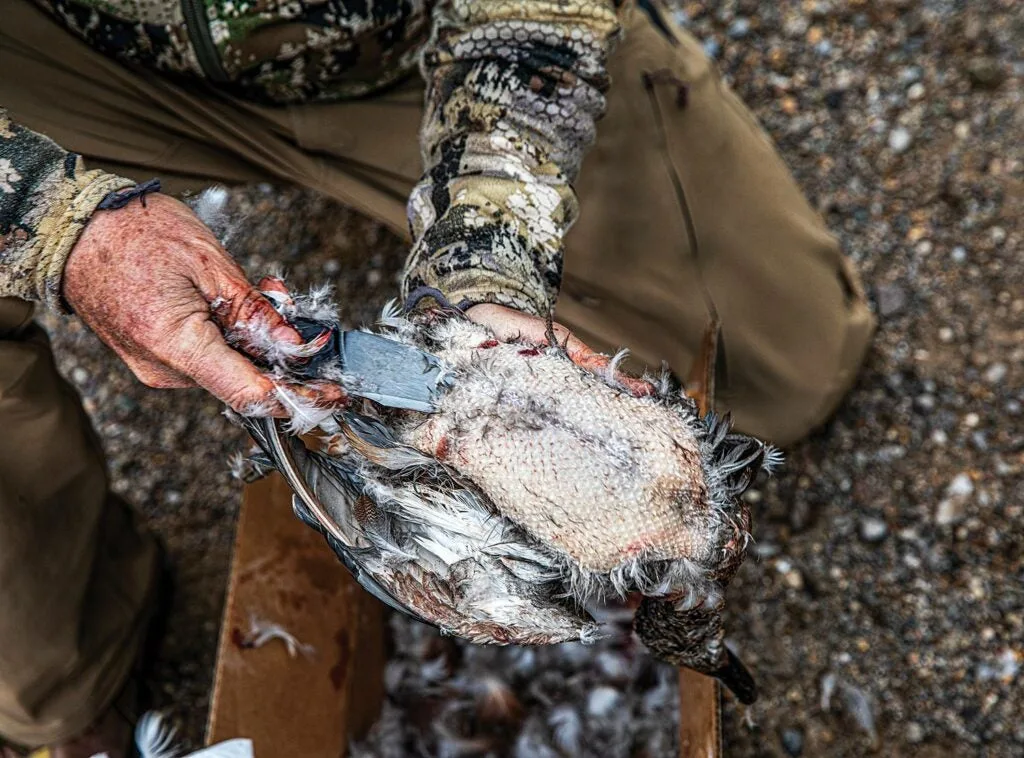
The author cleans some birds. Tom Fowlks
“All yours,” I said to Powell, rubbing my bicep, when he brought the duck back to the blind. “That’s a nice bird.”
Five ducks, five species. I started getting greedy. This far south, it’s possible to shoot birds that rarely venture farther north. Come on, cinnamon teal, I thought. Bring it on home, Mexican mallard. A pale hunting moon hung high in the sky, and I took it as an omen that our luck would hold.
But it was the sun that did us wrong. At first it was a trio of pintails that flared off the layout blinds, and I consoled myself with the thought that it was just pintails acting like pintails. Then flocks of mallards gave us a wide berth. I looked around. Our layouts cast black shadows 5 feet long. The decoys were as lifeless as roadkill. Now even the wigeon swung far to the south to skirt out of range. For the next hour, not a single duck gave us a look as we broiled in the sun. Powell and I made a pact: One more duck, and then we’d jet for the nearest air conditioning.
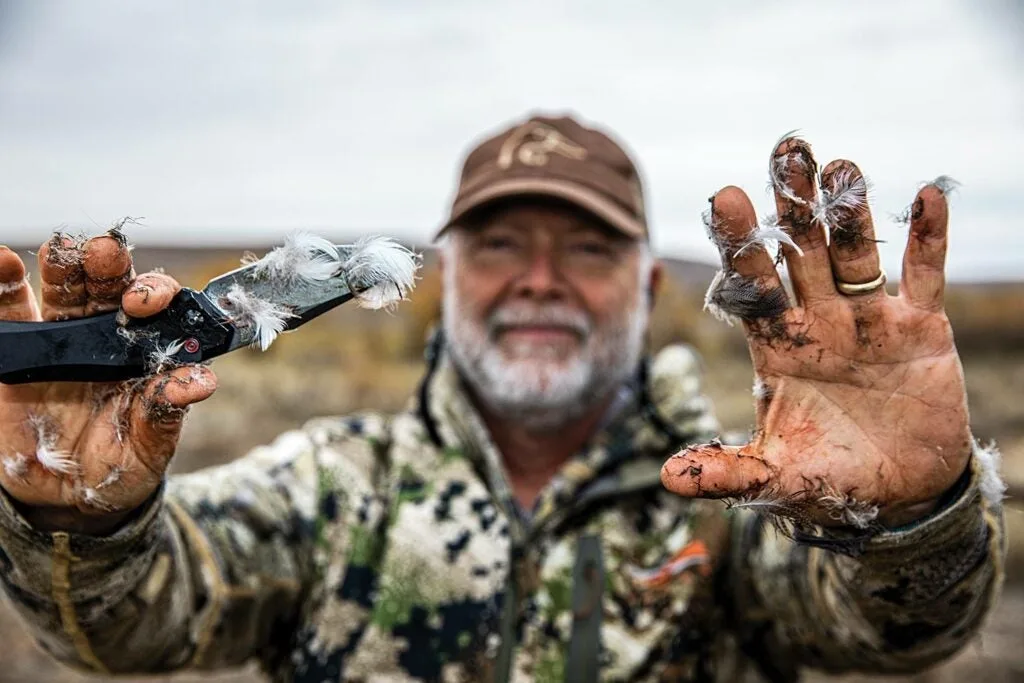
Nickens isn’t afraid to get his hands dirty. Tom Fowlks
An hour and a half later, a single bird rocketed over the slough from behind, startling Powell and me out of a half-snooze. I watched the single make a great, looping flight far beyond our boot tops, lost it against the dark bulk of a tall mesa, and then grinned when it rose into the blue sky, its slender silhouette turning on scimitar wings. Powell chuckled. “All yours,” he said.
“Hello, Mr. Spoonie,” I said, slipping the shotgun to my shoulder. “It had to be you.”
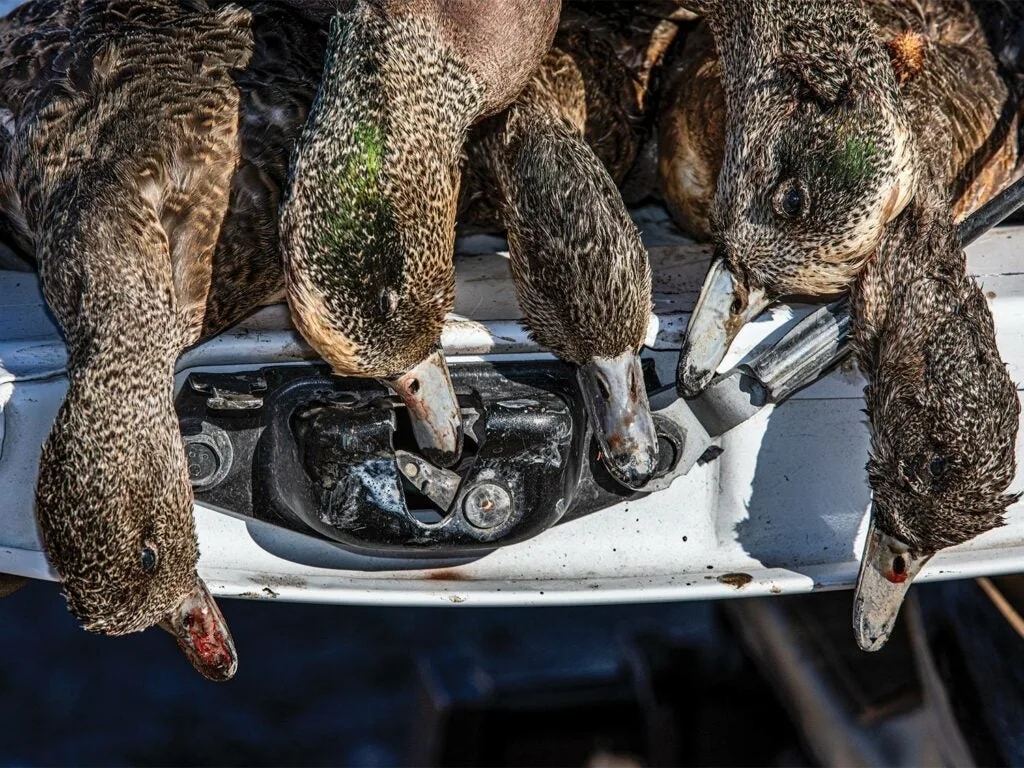
A morning’s worth of wigeon sits on the tailgate. Tom Fowlks
Out of This World
After our mixed-bag hunt outside Truth or Consequences, Powell and I stepped on the gas. We had a four-hour drive to Roswell and the marshes along the Pecos River, but it’s a road-tripper’s dream route: In San Antonio, we ate at the Owl Bar & Cafe, whose famous green-chile burgers fueled the work of atomic scientists in the mid-1940s as they fine-tuned the world’s first nuclear bomb. We scouted the Smokey Bear Historical Park, where the eponymous bruin was rescued as a cub after a fire in 1950 and laid to rest 26 years later. We took a tour of Lincoln, its buildings still bearing bullet holes from Billy the Kid’s 1878 jailbreak. Then, falling out of the Capitan Mountains, the world turned to bunchgrass, rocks and dirt, and busted windmills. Soybean fields sprouted old adobe houses and abandoned Minuteman missile sites with their silo doors rusted open. I saw the first alien on a billboard a few miles from town, grinning over an ocotillo cactus. “Welcome to Roswell,” Powell said. “It’s feeling ducky already.”
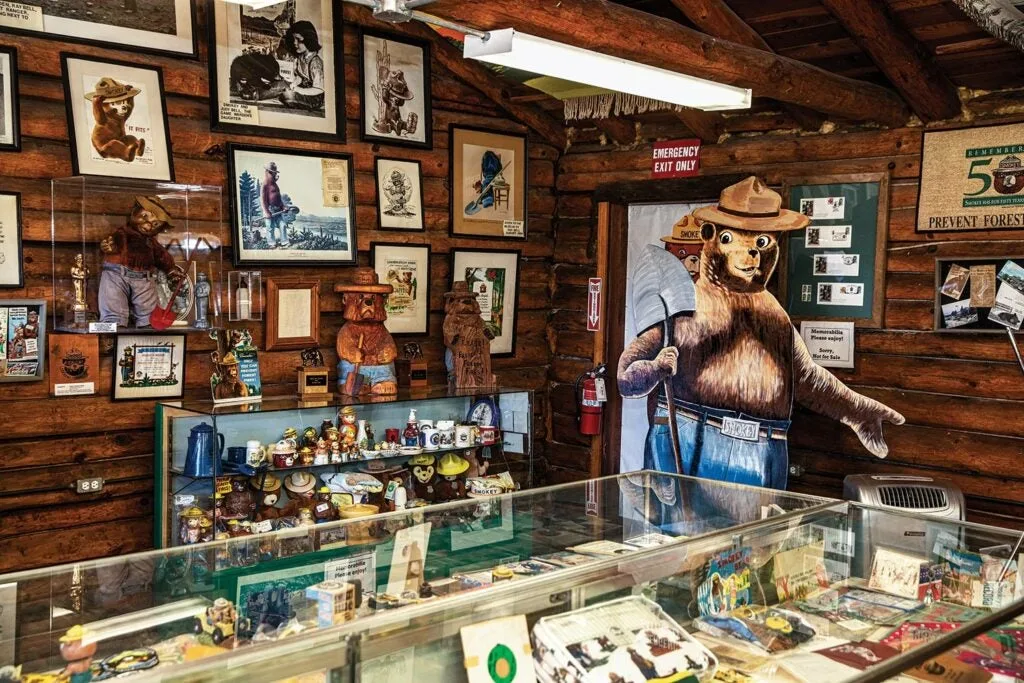
Between hunts, the author and Powell made time to hit up some of the local tourist attractions in New Mexico. Tom Fowlks
And feeling more like home to Powell, whose father attended the New Mexico Military Institute in Roswell. “Believe it or not,” he said, “they still had a cavalry unit when he was there.”
As it turned out, we could have used a few mounted scouts. Our next stop was Bitter Lake National Wildlife Refuge, which straddles the Pecos River where the Chihuahuan Desert butts up against the Southern Plains. The refuge can hold tens of thousands of ducks and geese, but we had meager intel to help us narrow our search. We scrambled in the late afternoon—all that green-chile-cheeseburger eating and Smokey the Bear rubbernecking had put a dent in our scouting time. With the sun dropping fast, we followed a coyote trail through big bluestem and head-high gamagrass on a hunch that yodel dogs would have as keen an interest as we did in finding a decent duck hole. Our hunch played out when we stumbled, literally, into a lush cattail-ringed marsh. It was duckless at sunset, but the pressure was on, so we rolled the dice the next day.
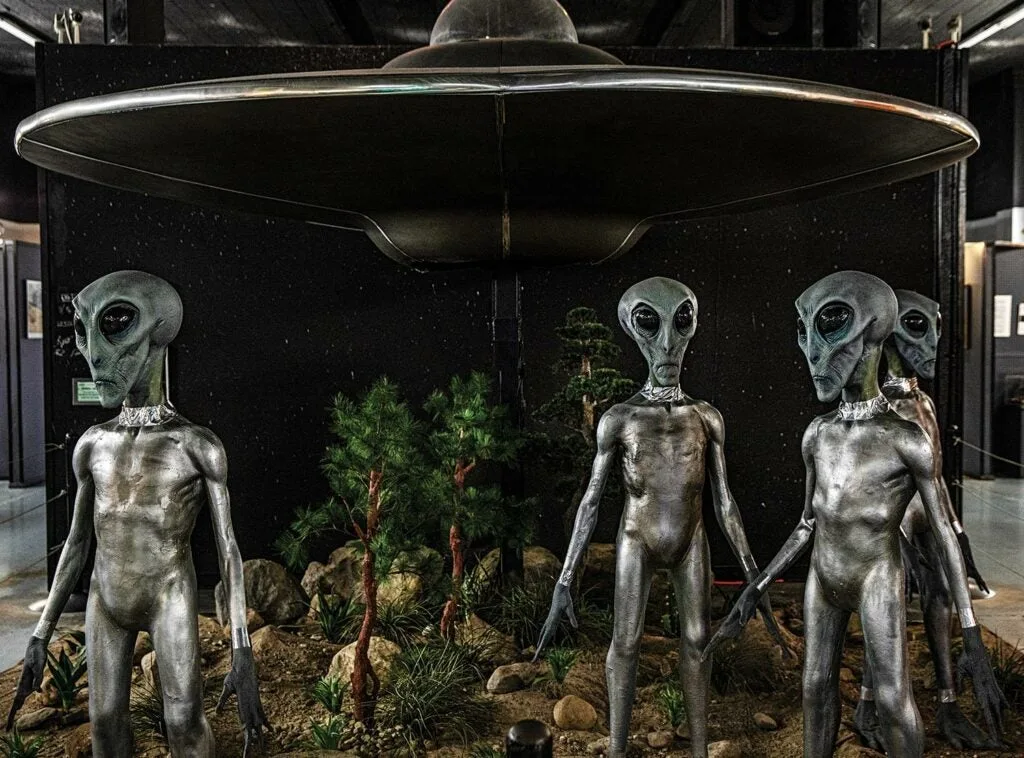
Sure is a strange setting for a duck hunt. Tom Fowlks
By midmorning, we hadn’t felt ducky in hours, and we’d run out of patience, cold water, biscuits, and things to talk about. We were in one of the most promising-looking spots I’ve ever hunted, with a truck full of gear and a few square miles of empty to explore. But nothing was flying at Bitter Lake. There were no birds on the slough, the sky was so clear and blue, it hurt to look up, and there wasn’t enough wind to make a candle flame twitch. It was one of the days where you’d stay home if you were home. But we were on the road and, ducks or no ducks, we were there to hunt.
I sat in our cattail sauna and stewed. I could feel the bad mojo rising inside. I take a lot of pride in preparation. I have a Plan A, Plan B, and multiple variants of Plan C queued up at all times. There’s something about ducks that hits me differently than any other quarry. I don’t like to work so hard for nothing. Beside me in the marsh, Powell thumped his shoulder against mine. “I feel Bad Eddie coming on,” he said. We’ve hunted together enough for him to recognize the dark clouds. “Nobody wants to see Bad Eddie.”
“One duck, man,” I said. “That’s all I’m asking for.”
So we sat and hoped, and then I ran out of hope too.
“Give me an hour,” I said. “Then we can go.” I stood up, grabbed my pack, and pulled three decoys out of the spread. I headed up the slough, sloshing toward a meager cove a few hundred yards away. A small point of thick willows pushed into the open water. I’d been chewing on the spot for an hour. Maybe that’s all it would take. Shake things up. Change something, if just our angle on hope. I tossed two decoys into the main slough and a single into the cove, then hunkered down in a scrim of dead willow in the water. No bucket, no call, just three decoys and a pocket of shells. Over the next two hours I saw only two ducks, each one zipping up the far side of the slough. I got down lower, making myself as tiny as possible, until the water lapped over the back of my waders.
The choice was either hunt or bail. For another two hours, I hunted.
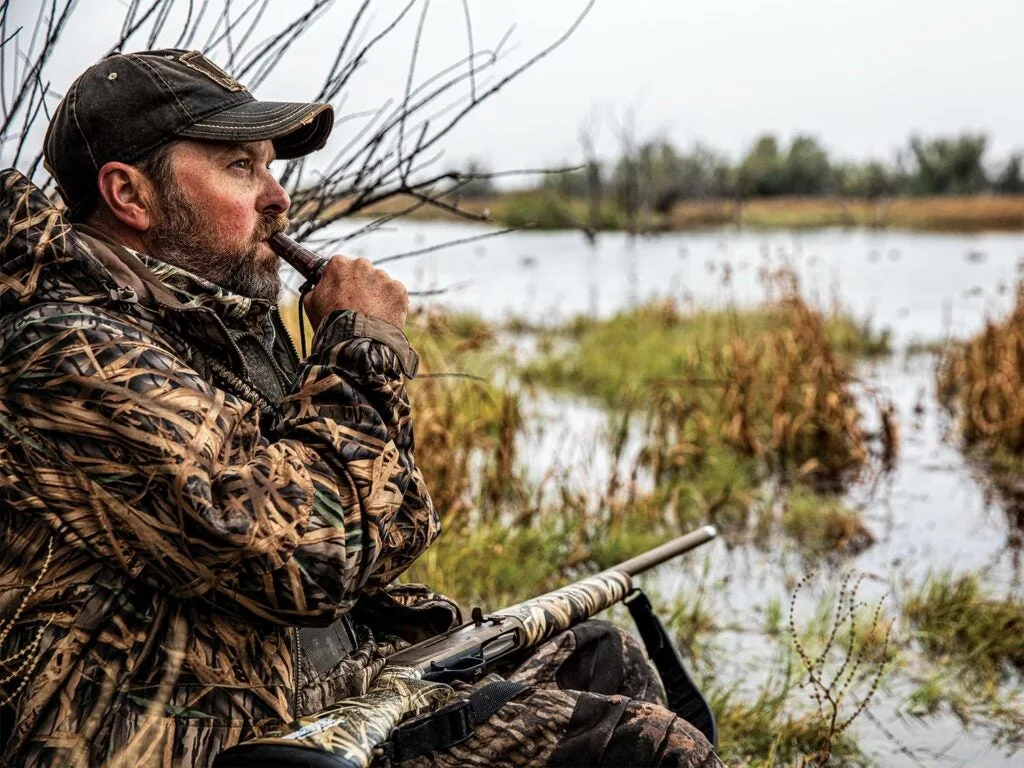
Powell calls to an incoming group. Tom Fowlks
That night, Powell and I smoked cigars on our inn’s porch while I tied large snap swivels to black paracord, fashioning a jerk cord, so tired from five days of burning both ends of the candle that I could barely work my fingers. I was kicking myself for not having a jerk cord in my pack that morning. It might have been all I needed. Could have pulled both those singles in. I couldn’t remember the last time I hunted ducks without a jerk cord in a pack pocket. I sulked in a cloud of cigar smoke, spiraling downward into a foul duckless mood.
“How you doing over there?” Powell asked. “I think I might have to have some kind of intervention.”
My friend knows me too well. I sat back and took a deep breath. Tighten up, I heard Bad Eddie say. We didn’t come all this way not to kill ducks.
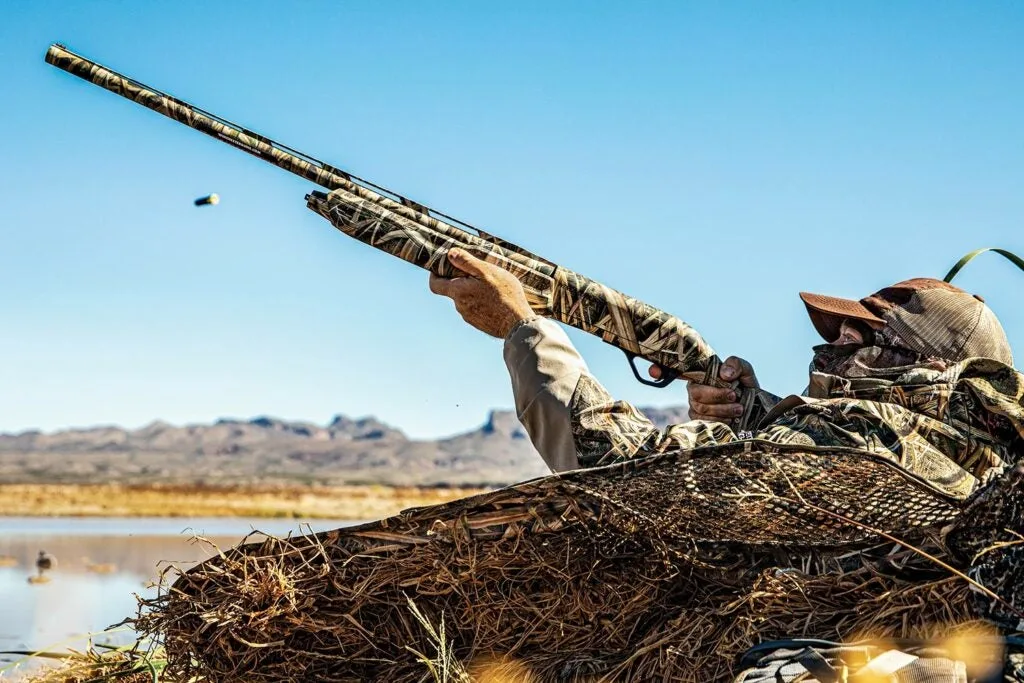
The author pops out of his blind and drops a duck near Roswell. Tom Fowlks
The End of the Road
Waterfowling, of course, is an eternal fount of hope: Every night could be a migrating night. Every dawn brings another chance. Our last crack was at Bottomless Lake State Park, a complex of deepwater desert sinkholes and sloughs on the far side of the Pecos River outside Roswell. Months earlier, I’d put my fingers on a Google Earth image of the place and thought, I bet we could kill a duck there. I scrolled across the satellite map, following a dirt road to a path through the scrub, which skirted a green marsh. From there it looked like a straight shot of maybe 300 yards to a blob of open water. Might be a few trees in the way, I figured. Maybe a ditch or two. It didn’t look too bad. Such is the delusion of the long-distance duck-hunting road- tripper. From 1,500 miles away, everything looks easy.
Now, in the asphalt-black desert dark, I blinked at the OnX map in my hand. Where was the freaking water? We were sweating and breathing hard, and feeling a little stupid, dragging decoy sleds across hundreds of yards of crunchy bunchgrass and crumbling desert dirt. But after 45 minutes of searching, the eastern sky was going from black to blue. We had no options. Back toward the truck was a sliver of reflection, so we spun 180 degrees and headed for the only water we could find in a scrub desert of Pecos sunflower and salt cedar.
A half-hour after daylight, we knew it wasn’t going to happen. We put in a long sit filled with jokes and sweat-soaked shivers, but we were going through the motions. Neither of us wanted to quit, and we weren’t just being hard-headed. On days like these, you stay in the marsh not so much because you think your luck will change, but because you know that something inside you will change if you fold the cards too early.
A few hours later, while dragging the decoys out of the desert marsh, I pulled ahead in the scrub, moping. There was no way around it: It had been a hard six days, and all we had to show for the trouble were 11 ducks that would fit into a single six-pack cooler. I was feeling licked and demoralized, and had no interest in bantering back and forth on the hump back to the truck. And that’s when I remembered what another pal had said one time as we walked out of a deep hardwood cove in the Alabama turkey woods with nothing to show for our sweat.
“There’s a difference between leaving the field empty-handed,” he said, “and leaving the field beaten.”
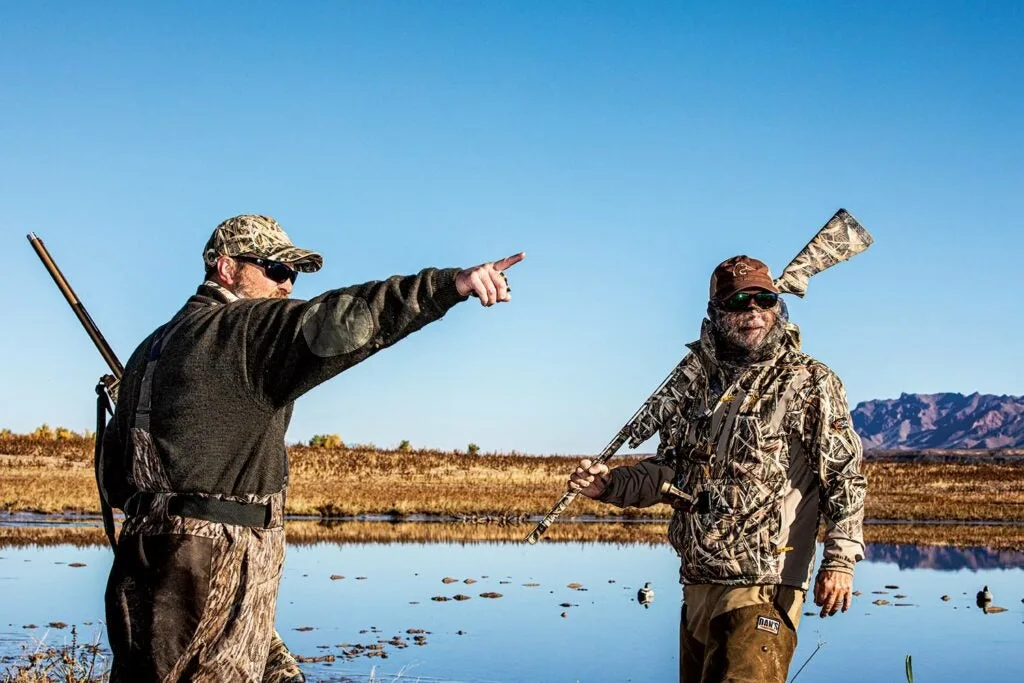
The hunters consider a new spot. Tom Fowlks
Bad Eddie was wrong. We didn’t come all this way just to kill ducks. We came all this way to chase good memories and pay our respects to the long roads behind, the ones that led us to lives filled with crazy dreams like an epic duck slam in the desert. Any road trip with a good friend brings a harvest you can’t put on a plate.
And I couldn’t leave the field beaten when I thought of some of that harvest. Like the gadwall that nearly took my head off. Remembering the moment, I laughed out loud for the first time in two days.
It was our third morning on the road, and I’d crumpled the duck high over the decoys. “Incoming!” Powell yelled a half-second before I threw my arms over my face as the bird thumped like a meteorite into the muck 2 feet off my right shoulder, dead center between my layout blind and Powell’s. By the time I poked my head out from under my arms, the gadwall was off like a roadrunner through the cocklebur.
I pushed out of the blind in hot pursuit, my unbuckled waders sagging around my knees. The duck crossed a slight rise, 40 yards away, silhouetted for a quick moment like a mule deer making a break over a ridgeline. Powell howled with laughter as my shot puffed sand a foot off the duck’s right wing. I pulled up my pants and chased the bird for another 50 yards, through cocklebur and mesquite, until I pinned it down with a wader boot and finished it off with a twist of the neck. Hands on my knees, blowing hard, I thought it all looked like some scene from a spaghetti western—the desert and sand flats, the sun rising over rocky mountains, a dead body at my feet.
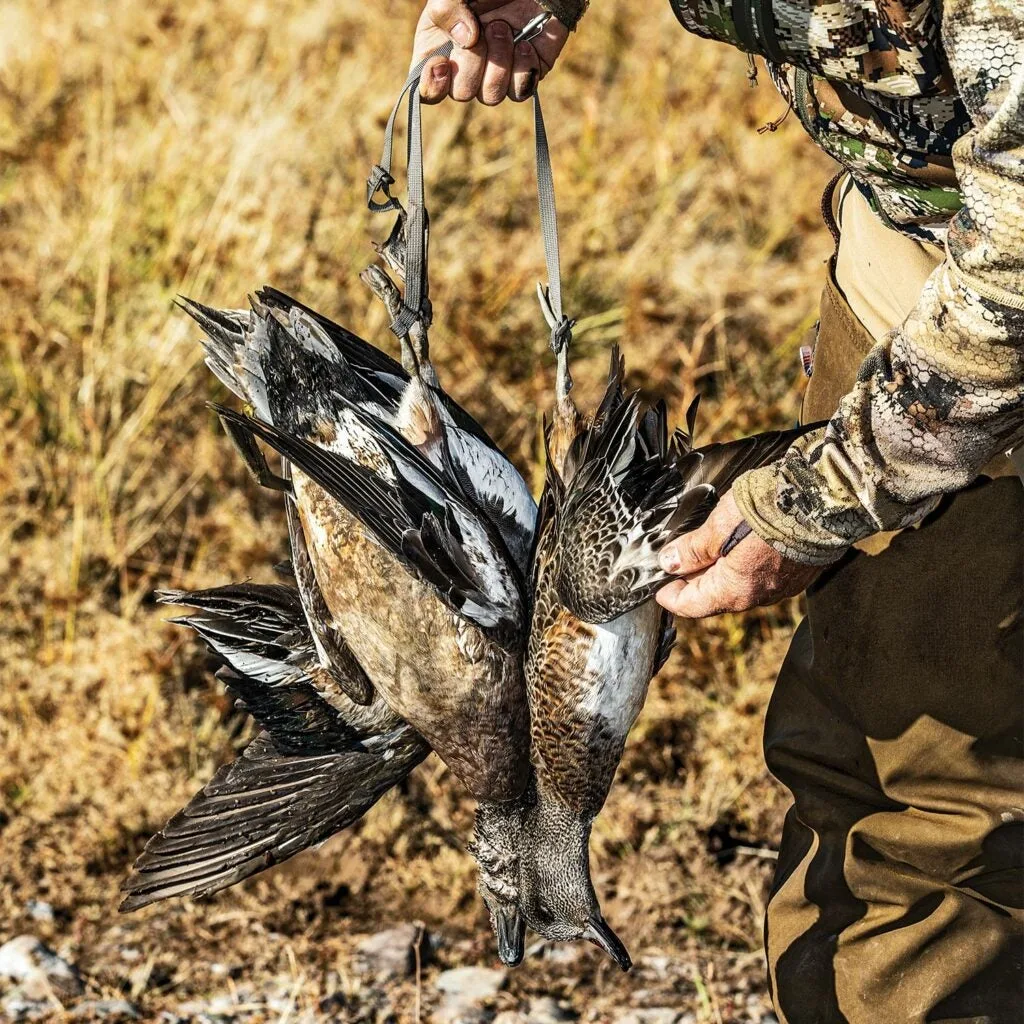
A lighter-than-desired strap. Tom Fowlks
But it wasn’t the duck at all, nor a memory from a blind or a desert marsh, that will stay with me the longest from this New Mexico road trip. It was a moment on the drive from Bitter Lake to Roswell. The sky over Capitan Peak was going from orange and pink to deep blue and black, and long skeins of sandhill cranes coursed overhead. Powell pointed toward the tiny town of Ruidoso, in the Sierra Blanca Mountains, where his family had their cabin in the pinyon pines and junipers.
“That’s where we brought Dad,” he told me. “Where we spread his ashes. We knew that’s where he would want to be. Hard to believe it’s been three years already.”
Powell looked out the window toward the dark plains, up to the high country, to the north, to that place where the ducks and the cranes and the geese come from.
That’s what I would remember after six days on the duck-hunting road. Not the easy birds or the tough mornings, but my friend in the dark, face awash in the weak green light of the truck’s display panel, missing the men who helped him love to hunt in the desert.
This article originally appeared in Vol. 125, No. 1 of Field & Stream.

